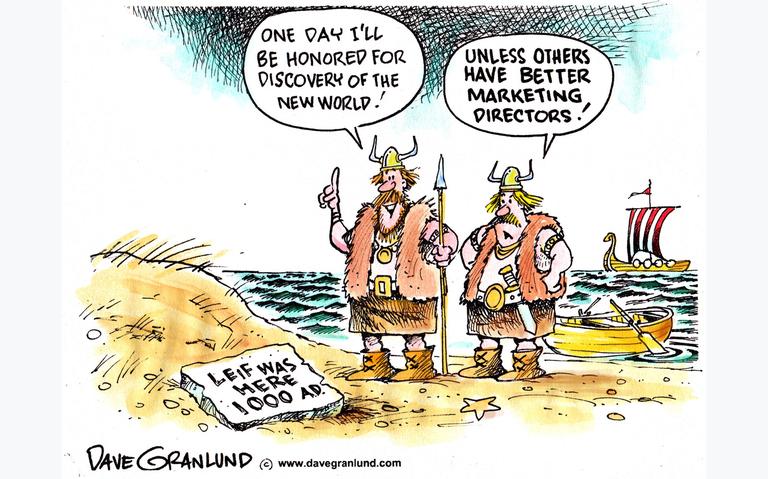|
Local View: Let's please rename Columbus Day for Amerigo Vespucci |
 |

By John Freivalds
Duluth News Tribune
Published 10/1/2021
As Columbus Day approaches two Mondays from now, I wonder how many people know who Christopher Columbus really was. Growing up in Washington, D.C., and then being a Peace Corps volunteer in Colombia, I made no connection to Columbus the person. It was just a name. Yes, there is a Columbus, Minnesota, and Duluth has a Columbus Street, and throughout the United States there are Columbuses all over.
Now, many people want to disavow and rename Columbus Day and celebrate the day to honor Indigenous people instead. Or others want to find a new way to celebrate Italians.
OK, there are really two parts to understanding Columbus. One is the myth that he discovered America and brought western civilization and values to a new part of the world — for Europeans that is. And the second is honoring Columbus’s Italian heritage. He landed on several islands in the Caribbean but never set foot on North America when, in fact, he thought he had landed in Asia. And he knew the world was round.
Christopher Columbus was born in Genoa in 1451 (he died in 1506), which then was a part of Italy. Genoa is a port, and so Columbus became a seafaring man, explorer, and hustler. He convinced the queen of Spain to finance a trip to Asia to gather spices.
But as journalist and media critic Norman Soloman reflects in “Columbus Day: A Clash of Myth and History,” many people choose to hold onto the myths instead of reality with regard to the events surrounding Columbus. Soloman disputes the idea that the Columbus-led arrival of the Spaniards was beneficial to those already there. He quoted Catholic priest Bartolomé de las Casas, who observed the region where Columbus was governor. Las Casas wrote, “The Spaniards were driven by ‘insatiable greed’ as they killed and tortured Native populations with the strangest and most varied new methods of cruelty.” He lamented, “My eyes have seen these acts so foreign to human nature, and now I tremble as I write.”
The Indigenous peoples were soon forced into slavery and punished with the loss of a limb or death if they did not collect enough gold, a portion of which Columbus kept for himself. He was made governor of the Spanish Caribbean, and his rule was so brutal that the queen of Spain recalled him in 1499 and brought him back in chains. In sum, Columbus was not a nice man.
However, he was Italian. In 1892, President Benjamin Harrison, to atone for the murder of 11 Italian migrants, made Columbus Day a onetime holiday. But through the years Italians used Columbus Day to serve as a day to honor their heritage; after years of lobbying the Knights of Columbus and others, Columbus Day finally became a federal holiday in 1971. Fair enough, the Mexicans have Cinco de Mayo, Germans Oktoberfest, Irish St. Patrick’s Day, and the French Bastille Day to honor their heritages.
In many Latin American nations, the anniversary of Columbus’s landing has traditionally been observed as the Día de la Raza (“Day of the Race”), a celebration of Hispanic culture’s diverse roots. In 2002, Venezuela renamed the holiday Día de la Resistencia Indìgena (“Day of Indigenous Resistance”) to recognize Native peoples and their experiences. Several U.S. cities and states have replaced Columbus Day with alternative days of remembrance. States including Alaska, Hawaii, and Oregon commemorate Indigenous Peoples’ Day, as well as cities including Denver, Phoenix, and Los Angeles. Duluth has been celebrating Indigenous People’s Day on Oct. 11 since Mayor Herb Bergson was in office.
I am not against Italians celebrating their heritage, but why honor Columbus? Why not Florentine mapmaker and explorer Amerigo Vespucci (1454-1512), after whom America is named? Vespucci decided to start recording his exploring accomplishments, writing that his accounts would allow him to leave "some fame behind me after I die." His writings show that the Americas were a whole other continent, not part of Asia, and a German cartographer decided to name them Amerigo from whence we got our name.
So this is for you Amerigo.
John Freivalds of Wayzata, Minnesota, is the author of six books and is the honorary consul of Latvia in Minnesota. His website is jfapress.com. He wrote this for the News Tribune.
